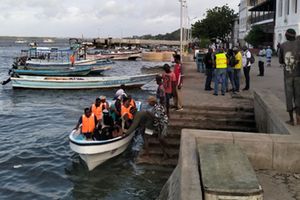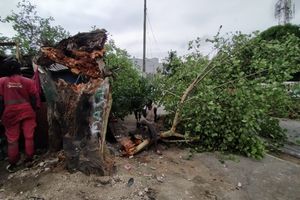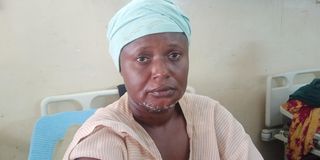
Aisha Mohamed, a fisherwoman from Mnarani in Kilifi North Subcounty, at the Kilifi County Referral Hospital on May 25, 2025 after surviving 16 hours in the Indian Ocean.
On Friday, May 23, a crew of fishermen from Mnarani village in Kilifi North disregarded an alert to stay away from the Indian Ocean and sailed into the deep sea at 6pm. It was a decision that would cost lives within hours.
The authorities had issued the advisory due to strong winds across the Coast and other regions.
The team boarded four boats, each carrying three crew members.
One of the boats carried two men and one woman: Mr Abdalla Muhidhin, the captain; his co-captain, Mr Hatari Kitsao; and Ms Aisha Mohamed.
They left the Kilifi old ferry site to go fishing in the deep sea. However, they never returned after their boat capsized at 8pm, according to Kilifi North Sub-county Police Commander Stanley Tonui.
“Other fishermen went to look for them in the morning and managed to rescue Ms Aisha who was found struggling to swim out of the water,” he said.
Her two colleagues have not been found.
Ms Mohamed, who survived 16 hours in the water, is being treated at Kilifi County Referral Hospital.
Coming to terms
She is bruised and swollen in several places, including her face, hands and legs.
Ms Mohamed, 39, looks frail and deep in thought as she tries to come to terms with the deaths of her two colleagues.
Surrounded by some of her relatives, she recounted that they had initially planned to fish in the shallow waters at Kwa Ngala, but had later decided to venture into the deep sea instead.
She recalled asking the crew to abandon the mission and return home, as the winds were strong.
They declined and proceeded to prepare for fishing.
The strong winds and tides pushed them further out to sea. “We went fishing in Takaungu, and immediately after docking the boat, a massive wave emerged from the waters and hit the boat, and it overturned,” she said.
They moved closer to each other, holding on for dear life.
“We were suffering in the water; the winds were strong and the tide was hitting us. It was not long before Captain Muhidhin said he was tired.
“I started crying, asking him not to leave us, and I passed him a rope to hold onto. He held it for about two minutes but continued to insist that he was tired and could not hold the rope anymore. We supported him but he could not make it and died in our arms,” she said.
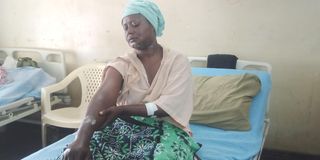
Aisha Mohamed, a fisherwoman from Mnarani in Kilifi North Subcounty, at the Kilifi County Referral Hospital on May 25, 2025 after surviving 16 hours in the Indian Ocean.
Ms Mohamed and Mr Kitsao tied Mr Muhidhin's body with a rope around his chest to stop it being carried away by the water.
The tides were high at this time and the winds were strong, so they tied themselves to the boat with ropes to avoid being swept away.
Pointing to the wounds and bruises on her hands, Ms Mohamed said that they had stayed in the water until morning, as there had been no one available to rescue them.
“We became tired and could not continue holding the body of the captain anymore and released him in the waters,” she recalled.
At around 10am, Mr Kitsao told Ms Mohamed that they should untie themselves and swim towards home.
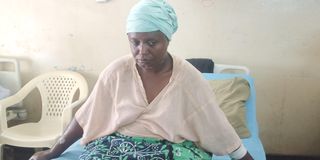
Aisha Mohamed, a fisherwoman from Mnarani in Kilifi North Subcounty, at the Kilifi County Referral Hospital on May 25, 2025 after surviving 16 hours in the Indian Ocean.
The difficult part was swimming in the strong winds and high tides that kept pushing them back.
“We could not tell whether the body was still being held by the ropes since everything was messy,” she said.
The two of them started swimming home. Fortunately, Ms Mohamed had a small life jacket, but the co-captain did not.
In the spirit of humanity, she had to support her colleague to ensure he made it home safely.
“We were swimming, and at some point, when my co-captain was tired, he clung on to me to support him to move in the waters. Whenever I was tired I would ask him to stop holding me,” she added.
Ms Mohamed encouraged the captain to keep swimming, hoping they would reach the shore.
The tides were high and the winds were strong, but she positioned herself strategically in the water.
"I was trained how to swim in case of an emergency, and I also advised Mr Kitsao how to do it," she said.
At one point, he managed to move ahead of her, thanks to the skills he had learned.
Ms Mohamed was determined to survive, but she was growing weaker with every passing minute as she struggled against the high tides.
“All this time, I was screaming for help. I spotted a boat from far away and I continued to shout until they spotted me,” she said.
Crews from the Mnarani Beach Management Unit (BMU) located Ms Mohamed and threw her a rope as they advanced towards her.
She was taken to Kilifi County Referral Hospital, where tests confirmed that she had no internal injuries. Mr Kitsao did not make it.
“They managed to save me, and I thank God I am alive today and doing well, but both my two captains died,” she added.
Captain Muhidhin's body was found in Watamu on Sunday and buried according to Muslim customs.
“I am appealing to my fellow fishermen to stop going fishing whenever there are high tides and strong winds,” she added.
Ms Mohamed, a survivor of gender-based violence, started fishing in 2023 to raise money to support her four children.
It all began with some fishing exercises in shallow waters, after which she was trained to venture into the deep sea.
After returning home from working as a housekeeper in Saudi Arabia, she started working on a construction site.
Ms Mohamed says she later quit due to sexual exploitation by her bosses.
“Many times I used to go to look for jobs in the construction site but I was [turned away] because I declined sexual advances from my bosses,” she said.
She explained that the reason she decided to train as a fisherwoman was that her husband had assaulted her when she was three months pregnant, leaving her with a head injury.
Ms Mohamed revealed that she had taken sole responsibility for her children after their father abandoned her.
Despite her dedication to her work, she said that it has not been easy for her to work in the male-dominated industry.
Initially, she faced resistance and discrimination from some fishermen, but some were understanding and allowed her to join their crew.
“Some men did not want me to go fishing because I was a woman but I insisted since that was what I wanted to do for a livelihood,” she added.
After trying out several boats, Ms Mohamed secured a permanent fishing position on the Ilham, owned by Captain Muhidhin, in January this year.
She earns between 8,000 and 15,000 shillings daily during a good season, and 3,000 shillings when the catch is poor.
“Fishing is good and has good money, the reason I managed to take my son back to school after he dropped out for one year,” she said.
She expressed her hope that one day she will own a boat and create jobs. “My dream is not just to be a fisher, but to advance my training and be captain in a ship and I always pray that one day I would get an opportunity to work overseas,” she said.
Her mother, Ms Shida Katana, was at the hospital nursing her sixth child and only daughter.
She said that she had received news about her missing daughter from a neighbour's son whom she had met on her way home.
She said that it was around 10am and that a group of people were heading to the beach. She didn’t know what had happened until the boy asked her if her daughter had been found.
“I was shocked and helpless. My body was weak and I walked to the beach while sobbing,” she said.
Ms Katana revealed that one of her sons had comforted her, encouraging her to go back home while they followed up on their missing sister.
“I sat on the beach, and everyone came to say sorry, and this hurt me more,” she said.
Two of her sons told her that they would search for their sister using their boats as the rescue team had run out of fuel.
“My sons and their friends contributed some money and fuelled three boats to search for their sister,” she added.
The three teams split in different directions in the Indian Ocean.
Ms Katana said prayed that all her children would return safely.
“I did not have peace of mind, and within some time, I was informed that she had been found,” she said.
“I was shaking, weak and in pain, and if it were not for a woman well-wisher who came to hold and encouraged me, I would have collapsed.”
She said that in the hospital's emergency wing, her daughter was looked terrified and confused.
“I am pained because my daughter is struggling, endangering her life fishing to provide for the children because of poverty,” she said.
The mother of nine described her family's life as humble and full of struggle.
Ms Katana appealed for well-wishers to support her daughter in raising her children.
Elsewhere, a fisherman who had been reported missing in Lamu was found alive on Sunday in the Chale area near Kiunga on the Kenya-Somalia border, thanks to the efforts of the search and rescue team.
According to Lamu County Emergency Operation Centre (EOC) Manager Iftakhar Majid, the ill-fated vessel was also retrieved.
The fisherman had managed to swim to Chale, where he clung to a rock until the rescue team arrived.

